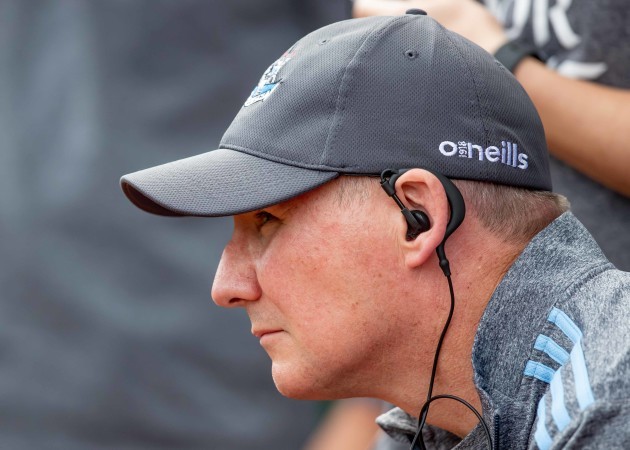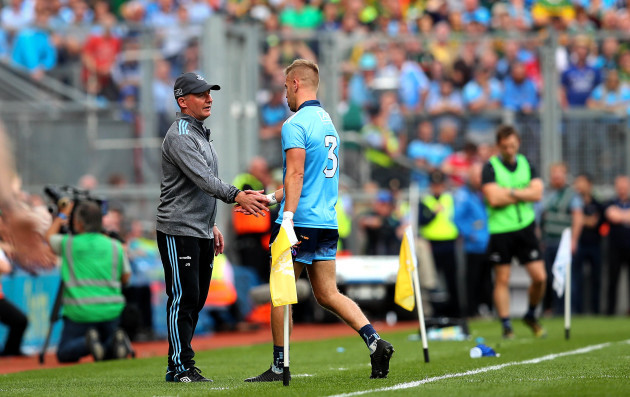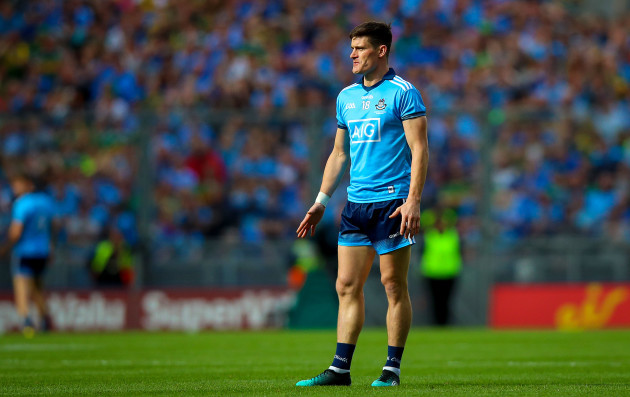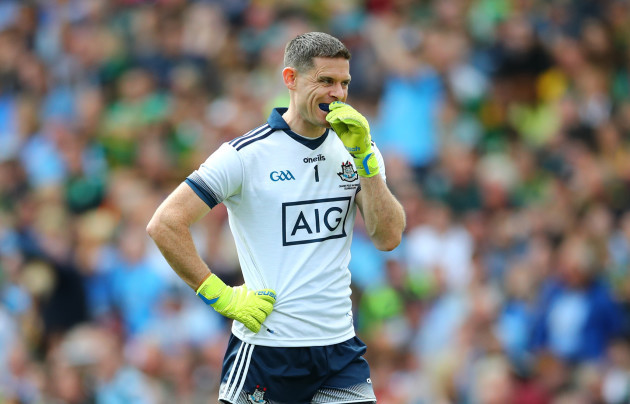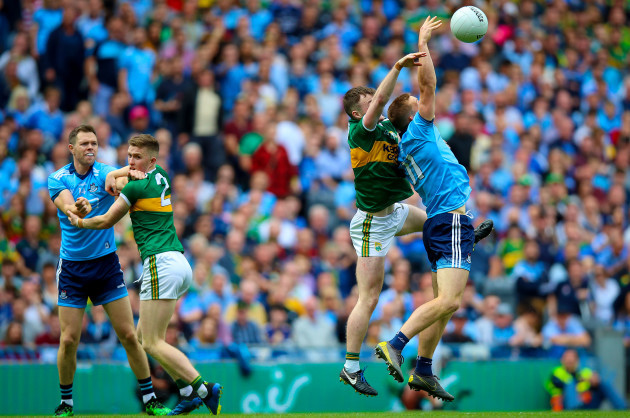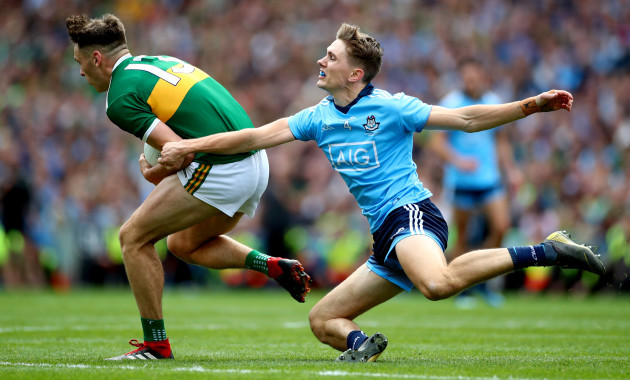JIM GAVIN CAN count on one hand the number of games where Dublin have performed well below their optimum level in championship football during his tenure.
After a bright start in the 2014 All-Ireland quarter-final, they were badly exposed at the back by Donegal and shipped 3-14 in a six-point defeat. It remains the only championship game Dublin have lost under Gavin.
The drawn 2016 final against Mayo was their next poor performance. Disrupted by Mayo’s physicality, a number of Dublin players looked off their game, they appeared flat, their touch was poor and their forwards never clicked. Ultimately, Mayo’s remarkable concession of two own goals spared Dublin a defeat.
Asked in his post-game press conference if Dublin’s display merited a six-out-of-ten rating, Gavin described that assessment as “over-generous.”
He was similarly frustrated with their draw against Kerry last Sunday week, which may have been their worst 70-minute display since the 2016 final. “The performance wasn’t good enough,” he declared after the game.
Dublin put in extremely poor first halves against Meath and Mayo this year but recovered to win convincingly with spectacular second-half showings. Similarly, in the 2016 semi-final against Kerry they went in at half-time five points down but raced out of the traps in the second-half to claim a two-point victory.
And while they finished the game stronger than Kerry 11 days ago, Gavin will be well aware that major improvements are required if they’re to get over the line on Saturday night.
So what would the Dublin boss have learned from the drawn game?
1. Be more ruthless on the sideline
Jonny Cooper fouled David Clifford twice between the 15th and 17th minute, conceding a penalty in the first incident when he received a tick before he was booked for the second. It was surprising to see no Dublin defender warming up at that stage given Cooper clearly looked in bother. He was sent off just before the interval, handing Kerry an extra man for over half the game.
At the very least, Gavin should have moved Mick Fitzsimons over onto Clifford with the Na Fianna man walking a disciplinary tightrope so early into the game. Since he took charge in 2013, Cooper has been one of Gavin’s most trusted lieutenants in defence and perhaps that clouded his judgement.
Gavin is usually held up as a ruthless decision-maker but his failure to make a call on Cooper almost cost Dublin the five-in-a-row. He won’t make the same mistake twice.
2. Use the bench earlier
Unusually for Dublin, by the 67th minute in the drawn game they’d only introduced two of their substitutes – Paddy Small and Eoin Murchan. The latter was an enforced change, coming on for John Small as a temporary sub, although he remained on for the rest of the game.
Diarmuid Connolly and Cormac Costello arrived onto the field in the 68th minute and Kevin McManamon was introduced two minutes later, but typically Gavin likes to give four or five players at least 20 minutes of action.
Similarly, in the semi-final they’d brought in just two players after 65 minutes. In their Super 8s hammering of Roscommon Gavin ran the bench early and had five subs on the field by the 51st minute. But even against Cork when the game was in the melting pot until the final 10 minutes, Dublin brought just one sub into the fray before the 64th minute.
It indicates a growing divide between the starting 15 and the rest and possibly Gavin’s increased distrust of his replacements, as evidenced in Connolly’s surprise return to the panel.
Gavin could do with mixing up his 26-man squad too with Bernard Brogan a live option to receive the call-up. Would he have converted one of the two shots at goal Paddy Small missed? It’s reasonable to assume so.
3. Trust Cluxton to beat the press
Kerry’s AFL-style overload on Stephen Cluxton’s kick-outs was something we haven’t seen before and it’s sure to become more commonplace in the coming years, given the copy-cat nature of the GAA.
But when Cluxton was able to kick the ball over the press like he did when he picked out Brian Howard for Jack McCaffrey’s goal, Kerry were wide open at the back. The Kingdom double-teamed Brian Fenton and will do so again, but Dublin still have brilliant fetchers in Howard, James McCarthy and Michael Darragh Macauley (if he retains his place).
Dublin registered 1-1 directly from Cluxton’s long kicks in the opening period. They might not win every long restart but with David Moran and Jack Barry focused on nullifying Fenton, there are plenty of other options for Cluxton to pick out with deliveries over the Kerry press.
4. Target O’Callaghan with high ball
When Con O’Callaghan has the ball in his hands, there aren’t many footballers who are more difficult to stop, as Lee Keegan found out to his detriment in the semi-final.
O’Callaghan endured a quiet afternoon by his own lofty stands in the drawn game but he still won a number of frees when he ran at his marker Tom O’Sullivan.
O’Sullivan possesses lightning pace which means it’s hard to win the ball out in front, but he hasn’t the physicality to stop the Cuala man when he runs at him. It’s likely Dublin will have identified this weakness in O’Sullivan and they could target O’Callaghan with high early deliveries onto the edge of the square.
When the All-Star comes to ground with possession, he only has one thing on his mind – goal. It would be no surprise to see O’Callaghan rattle the back of Ryan’s net on Saturday night.
5. Fitzsimons is the man to mark Clifford
Clifford clearly had the beating of Cooper from the early moments, even if he had three strikes at the posts before he got on the scoreboard. He scored a point, won the penalty and drew a couple of frees for O’Shea to slot over during the first period before Cooper’s dismissal.
Under the watch of Fitzsimons and even without much cover in front of the full-back line due to Dublin’s inferior numbers, Clifford’s influence waned after half-time. Much of that was down to the understated way that Fitzsimons defended him.
He was twisted and turned for Clifford’s stunning score after 49 minutes, but even still was right on the Fossa star’s boot as he got his kick away. Fitzsimons is a good match for Clifford in terms of height, strength and speed – he certainly matches up better than the shorter Cooper.
Fitzsimons allowed Clifford just two shots at the posts after he picked him up and it’s likely Gavin will opt to retain that match-up for the replay with Cooper set to follow Paul Geaney.
The42 is on Instagram! Tap the button below on your phone to follow us!
